#피우다
Text
Bite-sized Korean with 이게 맞아?!
*disclaimer: I am not Korean, I am not fluent in Korean, but I have taken formal classes, so this is to the best of my knowledge. If anything is amiss, please let me know either privately or in the comments of this post.
youtube
I'm going to discuss what Jimin says in the first three seconds of the trailer!
지민: 오늘 정국이 잘 때 안 춥게 형이 옆에서 꼭 안아줄게
I'll give you a cuddle tonight so that you don't feel cold.
Let's dive into the 단어!

오늘 - Today (but in this context, it's translated as tonight bc it's encapsulating the notion of it being *later* in the same day)
정국 - Jungkook
자다 to sleep
자다 in this case is conjugated to 잘 때 when added to the ~을/ㄹ 때 form, which indicates when a verb occurs/is performed. so it's like, when you sleep.
안 - Not
춥다 Cold
춥다 is added onto the grammatical form of ~게 and becomes 춥게, which functions like "so that" or "to allow for" in English. This is used to explain what influences the speaker to perform a certain action. Usually forms like this might appear awkward to the average English speaker because the form is usually structured backwards from what we're used to.
형 - Hyung
옆 Next to (paired with a ~에서, a dynamic location particle)
꼭 - Tightly, firmly (in this particular context)
안다 to embrace, to hug, to hold within one's arms
안다 is combined with the ~아/어주다 form, which indicates that the speaker wants the listener to do something for them. I'd say this form mostly closely equates to asking for a favor from someone. Since 안다 is a verb that is commonly paired with 주다 (to give), this form can also demonstrate that you are also doing something on behalf of the listener. In more polite forms, you'd use the verb 드리다 (for humility), but Jimin is older (and close) with Jungkook, so he uses comfortable language and sticks to 주다. 안아주 is then added to ~ㄹ/을게(요) form and becomes 안아줄게, which is when the speaker states their intention to do something unless the listener refutes them.
So ig you can see this sentence like: When you sleep tonight, so that you don't get cold, hyung will be next to you and will hold you tight.
That's a little too wordy, however.
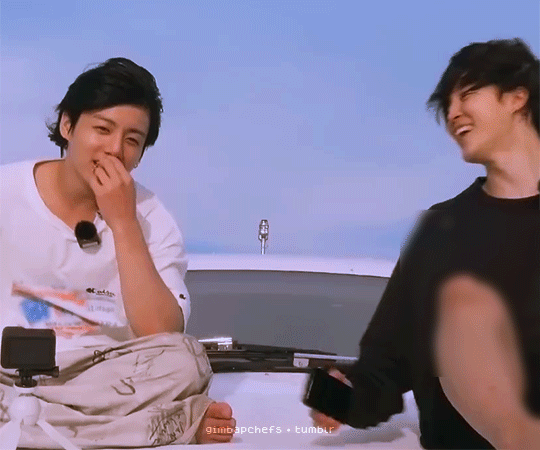
Other Notes | 때 usage
There's also a form of 때 that can be paired with nouns. ~을/ㄹ 때 is used exclusively with verb forms, but you can use 때 by itself next to nouns. ex: 방학 때 - during (school) vacation
중학교 때 제가 좋아하는 과목은 수학이었어요.
When I was in/During middle school my favorite subject was math.
중학교 middle school, 제 my, 좋아하다 to like, 과목 subject, 수학 math, 이다 to be
Also another form of 때 is ~을/ㄹ 때까지, which is like, until (verb) occurs. In this case, 때 is added to ~까지, which means until/up to. In the song Spring Day (봄날), at the end they sing:
다시 봄날이 올 때까지
Until that spring day comes again
다시 again, 봄날 spring day, 오다 to come
꽃 피울 때까지
Until the flowers bloom
꽃 flower(s), 피우다 to bloom
Other notes | ~ㄹ/을까(요), ~ㄹ/을게(요), ~ㄹ/을래(요) verb attachments
~ㄹ/을게(요) is like, I'm going to do this (if that's alright) or I'm planning on doing this (if you're fine with it). It's more of a statement rather than a question/suggestion, but it carries a kind of nuance that can fish for the consent/permission of the listener.
불을 켜드릴게요.
I'm going to turn on the light (for you).
불 light, 켜다 to light, ignite
~ㄹ/을래(요) is an invitational form that usually expresses the desire or want to do something. It's like forming proposals like, "will you do… (together)", "let's...", "would you like to...", or "do you want to...". It's a form that pays more attention to what the listener wants to do.
같이 밥 먹을래요?
Let's eat together/Shall we eat together?
같이 together, 밥 rice/meal, 먹다 to eat
~ㄹ/을까(요) is also an invitational form, asking "should I..?", "I'm thinking of...(but give me your thoughts)", "should we…?". Honestly, when I first encountered this form, I wondered what made it different from 을/ㄹ래(요), but from my understanding this form values the opinion of the other person (about information they may not know) and also asks for an opinion or permission about things that have yet to occur. So this form can almost be used like the English statement of: "What do you think? Should we...?"
불을 꺼줄까요?
Do you want me to turn off the light?
불 light, 끄다 to put out, to extinguish

That's all! Until next time ;p
#jikook#kookmin#bts#jimin#jungkook#이게 맞아?!#crazy what you can dig up in only three seconds#are you sure?!#korean learning#like i said if any of this is wrong lmk lol#im still a student after all!#한국어
102 notes
·
View notes
Text
Agust D - Amygdala [lyrics+vocab]
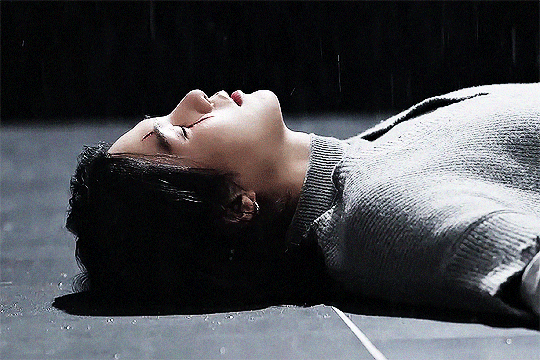
I don't know your name
I don't know your name, yeah
I don't know your name
요즘 기분은 어때?
I don't know your name, your name, your name
기억들로 여행
지우고픈 일들
요즘 기분은 어때, 어때, 어때?
▫ 요즘 - lately
▫ 기분 - mood
▫ 요즘 기분은 어때? = How have you been feeling lately?
▫ 기억 - memories
▫ 여행 - travel, trip
▫ 지우다 - to erase
지우고픈 일들 = 지우고 싶은 일들 = Things I want to erase
천구백구십삼
내가 태어난 달
엄마 심장의 수술, 수술, 수술
별의별 일이 많았지
뭐가 이리 다사다난한지
기억조차 안 나는 기억도
다 꺼내 보자고 하나씩
다 꺼내 보자고 하나씩
▫ 태어나다 - to be born
▫ 달 - month
▫ 심장 - heart
▫ 수술 - surgery
▫ 별의별 - all kinds of, various
▫ 다사다난하다 - to be eventful
▫ 꺼내다 - to take out
▫ 하나씩 - one by one
최선들의 선택
다음 차선들의 선택
차차 선들의 선택, 선택, 선택, yeah
원치 않던 일들
내 통제 밖의 일들
자 집어넣자 하나둘
그래 하나둘, 그래 하나둘
▫ 최선 - the best
▫ 선택 - choice, decision
▫ 차선 - the second best
▫ 원하다 - to want
▫ 통제 - control
▫ 밖 - outside, out of
▫ 집어넣다 - put sb into, throw sb into
I don't know your name, your name, your name
기억들로 여행, 여행, 여행
I don't know your name, your name, your name
자 지워보자 하나씩, 그래 하나씩
My amygdala (My amygdala)
어서 나를 구해줘 어서 나를 구해줘
My amygdala (My amygdala)
어서 나를 꺼내줘 어서 나를 꺼내줘
My amygdala (My amygdala)
My amygdala (My amygdala)
이곳에서 구해줘 어서 빨리 꺼내줘, yeah, yeah
▫ 어서 - hurry, fast
▫ 구하다 - to save
▫ 이곳 - this place, here
▫ 빨리 - fast
Uh-uh, 그래 참 별의별 일이 많았지
Uh-uh, 귓가엔 엄마 심장 시계 소리
Uh-uh, 전하지 못했던 내 사고 소식과
스케줄 중에 걸려 온 전환 아버지의 간암 소식
(Woah-oh) 최선의 선택들이 맞았었길
(Woah-oh) 그 또한 모두 지나가 버렸기에
그래서 이 수많은 고통은 날 위한 것일까
끊임없던 시련은 날 죽이지 못했고
다시금 나는 연꽃을 피워내
▫ 귓가 - around my ears
▫ 엄마 심장 시계 소리 - the sound of the clock in my mom's heart
▫ 전하다 - to convey
▫ 사고 - accident
▫ 소식 - news
▫ 스케줄 - schedule
▫ 전화가 걸려오다 - to get a phone call
▫ 간암 - liver cancer
▫ 맞다 - to be correct
▫ 지나가다 - to pass
▫ 고통 - pain
▫ 끊임없다 - to be ceaseless
▫ 시련 - ordeal, hardship
▫ 죽이다 - to kill
▫ 다시금 - again
▫ 연꽃 - lotus
▫ 피우다 - to bloom
148 notes
·
View notes
Text

빛 하나 들여보내는 창(窓)이면 좋았다 우리는, 같이 살아야 같이 죽을 수도 있다는 간단한 사실을 잘 알고 있던 시절에 만났다. 네가 피우다 만 담배는 달고 방에 불 들어오기 시작하면 긴 다리를 베고 누워 국 멸치처럼 끓다가 '사람이 새와 함께 사는 법은 새장에 새를 가두는 것이 아니라 마당에 풀과 나무를 키우는 일이었다' 정도의 글귀를 생각해 너의 무릎에 밀어 넣어두고 잠드는 날도 많았다. 이불은 개지도 않고 미안한 표정으로 마주앉아 지난 꿈 얘기를 하던 어느 아침에는 옥상에 넣어놓은 흰 빨래들이 밤새 별빛을 먹어 노랗게 말랐다.
/ 박준, 당신의 이름을 지어다가 며칠은 먹었다 <광장>
19 notes
·
View notes
Photo

놀이공원 = amusement park
테니스장 = tennis court
테니스 치다 = to play tennis
대학생 = university student
(담배를) 피우다 = to smoke (tabacco)
(머리를) 자르다 = to cut (hair)
(사진을) 찍다 = to take (a picture)
(돈을) 찾다 = to withdraw (money)
만들다 = to make
돌아오다 = to come back
다니다 = to go somewhere regularly
빌리다 = to borrow
타다 = to ride
아르바이트하다 = to have a part time job
내리다 = to get off
앉다 = to sit
일어서다 = to stand
열다 = to open
닫다 = to close
입다 = to wear
벗다 = to take off
사다 = to buy
팔다 = to sell
바꾸다 = to (ex)change
걷다 = to walk
보내다 = to send
기다리다 = to wait
산 = mountain
가족 = family
Grammar || Vocabulary || Practice
#Korean#Studyblr#Study#Koreanblr#Langblr#Learn#Language#Learning#Studying#Language Learning#StudyWithMe#SWM#SWMS1
68 notes
·
View notes
Photo
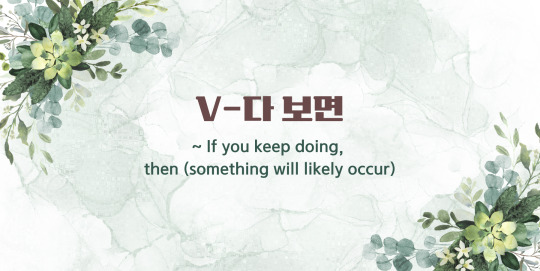
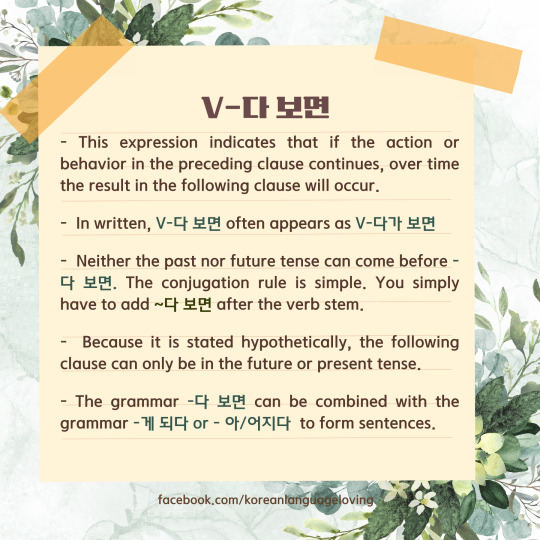
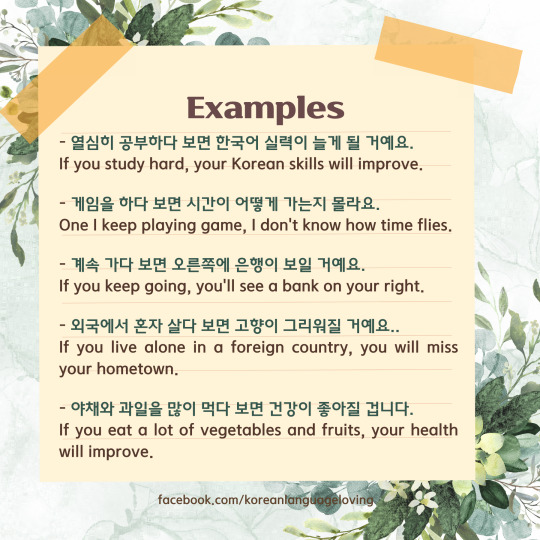
𝐊𝐨𝐫𝐞𝐚𝐧 𝐆𝐫𝐚𝐦𝐦𝐚𝐫: V-다 보면
✏️𝐔𝐬𝐚𝐠𝐞
This expression indicates that if the action or behavior in the preceding clause continues, over time the result in the following clause will occur. It is also written in the form -다가 보면.
E.g.
담배를 많이 피우다 보면 건강이 나빠질 텐데 걱정이네요.
(If you keep smoking, I am worried that your health will get worse.)
✏️ 𝐒𝐩𝐞𝐜𝐢𝐚𝐥 𝐍𝐨𝐭𝐞
(1) Neither the past nor future tense can come before -다 보면
E.g.
그 친구를 계속 만났다 보면 좋아질 거예요.(X)
그 친구를 계속 만나겠다 보면 좋아질 거예요. (X)
→ 그 친구를 계속 만나다 보면 좋아질 거예요 (O)
(If you keep meeting him, you will like him.)
(2) Because it is stated hypothetically, the following clause can only be in the future or present tense.
E.g.
자주 음식을 만들다 보면 요리를 잘 했어요. (X)
→ 자주 음식을 만들다 보면 요리를 잘 할 거예요. (O)
(f you cook often, you will be good at cooking.)
(3) As the preceding clause refers to an action or behavior that continues over time, it is often used with adverbs of repetition such as 계속 (continuously), 자주 (often), ...
(4) ) The grammar -다 보면 can be combined with the grammar -게 되다 or - 아/어지다 to express that after doing something repeatedly/continuously, you will become or in a certain state. It is often used when giving someone advice.
It will form the phrases:
V -다 보면 V-게 될 거예요.
V -다 보면 Adj-아/어질 거예요.
E.g.
네가 그렇게 열심히 일하다 보면 승진하게 될 거예요.
(If you keep working hard like this, you will get a promotion.)
규칙적으로 운동을 하다 보면 건강해질 거예요.
(If you exercise regularly, you will be healthy.)
✏️ 𝐂𝐨𝐧𝐣𝐮𝐠𝐚𝐭𝐢𝐨𝐧
The conjugation rule is simple. You simply have to add ~다 보면 after the verb stem.
가다 → 가다 보면 (If you keep going…)
살다 → 살다 보면 (If you keep living…)
피우다 → 피우다 보면 (If you keep smoking…)
✏️ 𝐌𝐨𝐫𝐞 𝐄𝐱𝐚𝐦𝐩𝐥𝐞𝐬
(1) 새로 휴대폰을 샀는데 사용하기가 불편해요.
- 계속 쓰다 보면 금방 익숙해질 거예요.
(I bought a new mobile phone, but it is inconvenient to use.
- If you keep using it, you will get used to it soon.)
(2) 영어를 잘 하고 싶은데 어떻게 해야 해요?
- 영어로 된 책을 읽다보면 영어를 잘하게 될 거예요.
(What should I do if I want to be good at English?
- If you read books written in English, you will be good at English.)
(3) 준비 운동 안 하고 달리기를 하다 보면 부상할 거예요.
(If you keep running without doing any warmup, you’ll injure yourself.)
(4) 그 어려운 일을 계속해서하다 보면 나중에는 아주 쉽게 할 수 있어요.
(If you continue to do that difficult work, you will be able to do it very easily later.)
(5) 한국어를 열심히 공부하다 보면 원어민처럼 될 수 있을 거예요.
(If you study Korean hard, you will become like a native speaker.)
#KoreanGrammar #Koreanlanguage #Studywithme
---
🌸 🌼 🌻
Support Me Here
#Korean Grammar#Korean Language#Study Korean#Learn Korean#Hangul#korean langblr#한국어문법#한국어 배우기#한국어 문법#한국어배우기#한국어능력시험#한국어#한국어수업#한국어 공부하기#한국어공부중#한국어공부#Cause and Effect
12 notes
·
View notes
Text
Winter (video)
☆⸒˚ ︶ 날아라, 나는 날아간다!﹒﹒﹏child-like instant, enveloped in a gust of wind that spirited me away. perched aloft, with th’rope stretched out before me—fear not, for it’s assuredly secure! amidst this exhilarating height, i played out scenes from our music video segment.
꒰͡ ͜ Ï ͜❀ ͡꒱ ₊ ࣪ emissary ּ 𓂃 두 땋은 예쁜 아가씨₊ in a grove, where venerable trees whisper ancient lore, she finds her refuge. surrounded by the gentle murmurs of foliage and the soothing caress of sunbeams sifting through, her délice unfurls. ㅤㅤㅤᅠ️ᅮ ᅮ ✿.



❛/ 꽃을 피우다 ː o’ 𝑓𝗅𝖾𝗎𝗋𝗌 ּ ✿ ࣪ ᮫ ࿐ her-{chuckles} 𖦹 ּ ͏࿙࿚ heart beats softly within a net of pure elegance and peace, cradling her in this enchanted realm. each moment here is a treasured gem; a serene bliss permeates every breath beneath these hallowed boughs.

ׅׄ ⬞⃝᷼ 𓂃🌷💭 ׅׄ ˒˓ in a dash of whimsy, i dolled am in a delightful pink tutu skirt and charming double braids! there’s a truly freeing feeling in expressing playful spirit. and, oh! in this time i’m embracing all the vibrant energy of youth while staying authentically me.


☆ 나의: ٬٬ ݁🌷 ּ 🫧 th’ lady who’s full of kid-like zest ֪ ׂ ᅠ️ꪆ୧ 내가 아기야𓂃 life’s too short to not infuse it with joy and mirth. this look is more than mere attire; it’s a prompt that, no matter how grown-up we get, there’s always space for a little bit of childish.

〬𓂂 𓇼 ! ׄ⠀𝗉𝗋͜𝖾𝗍𝗍yᅠ️▢ ᪲⠀ 𝗅ꪱ᪶𝗍𝗍𝗅𝖾 ⠀ 나 ❀ snared a snapshot unlike any other. here i stand, gazing intently through the lens, absorbing my environment with perceptive eyes. perhaps i’m pondering the scene around me—or maybe i’m weaving a charm to draw you in.

⠀ 🖇️ ⠀ּ⠀ 🧸 ˓ 𝗅𝗈𝗏ᧉ ִ 𝖻𝖾𝗂𝗇𝗀 ﹾ me ۰ ᭡ in a playful interlude beneath the sun, here i am, lost in a childhood reverie with an ever-faithful companion (the shadows of mine!)⠀★ ⬚ ͒ stretches and twirls along, mirroring my every whimsical gesture.

────────
Winter, Armageddon’
✿⃞﹗! each step i take resonates through the vast, forgotten halls. as i navigate a surveillance camera spot lone, its unblinking eye seeming to track my every move. then, OH! a startling call reverberating off the walls, [...] 🖇️📞 ◡ㅤ✿ :buZzing: [404 : 𝙽𝙾𝚃 𝙵𝙾𝚄𝙽𝙳!]
aespa, KARINA!
the majesty of the edifice calls—a tribute to architectural prowess and avant-garde. i advance, heeding a summons, a vow made in the hushed secrets of yesteryear. here, in this labyrinth of grandeur and solitude, the voyage through still in──── ☾ ּ ★ [404 : NOT FOUND].
✿͟ ͟ຼ 만사의 여왕 🗡 ּ ⿹͒ ⠀𝒲hispering 𝒲altz, 𓂃 ּ ⬚͒ she emerges as a sovereign ❀𝆬⃝𗈵𑇛 of the celestial sphere, her stance radiating regality against a canvas sparkling as though sprinkled with stardust. Sswathed in the deep, chain glinting, 고혹적인⭒ ✽ ˖* 𓂃

0 notes
Text
준비된 자에게 찾아오는 우연
세렌디피티의 법칙(Serendipity’s Law)이란
노력한 끝에 찾아온 우연한 행운을 말합니다.
18세기 영국 작가 호레이스 월폴이
페르시아 동화 '세렌디프의 세 왕자'라는 내용에서
처음 유래된 이론입니다.
동화 속 왕자들이 생각지 못한 행운으로
어려움을 이겨내는 이야기에서 그 의미가 생겨난 것인데
왕자들은 전설의 보물을 찾아 떠나지만
보물을 찾지 못하고 그 대신 계속되는 우연으로
지혜와 용기를 얻는다는 내용입니다.
사과가 떨어지는 것을 보고 중력의 법칙을 발견하거나,
모래 위에 불을 피우다 유리를 개발하거나,
목욕탕에서 넘치는 물을 보고 부력의 원리를
알아내는 것이 해당됩니다.
사무공간에서 흔히 사용되는 '포스트잇'도
비슷한 상황에서 만들어졌습니다.
스펜서 실버란 연구원이 강력접착제를 개발하려다가
실수로 접착력이 약하고 끈적거리지 않는
접착제를 만들었습니다.
누가 봐도 실패한 연��였지만
이를 보고 동료가 다음과 같은 아이디어를
냈습니다.
"꽂아 둔 책갈피가 자꾸 떨어져 불편했는데
이 접착제로 책갈피를 만들자!"
결국, 이 접착제로 '포스트잇'이 만들어졌고
3M을 세계적인 회사로 만들었습니다.
심리학자들은 이런 행운은 최선을 다한
이들에게만 찾아온다고 해서 세렌디피티의 법칙을
'준비된 자에게 찾아오는 우연'이라고
부릅니다.
우리 모두가 각자의 자리에서
준비하고 노력하면 세렌디피티의 행운이
찾아올 것입니다.
# 오늘의 명언
나는 운의 존재를 믿고 있다.
그리고 그 운은 내가 노력하면 할수록
내게 달라붙는다는 것을 알고 있다.
– 토머스 제퍼슨 –
入冬冷空气来袭;青岛开启“五彩纷呈”模式










0 notes
Text





[나경희 작가 개인초대전] '오늘도 나를 꽃 피우다' 작품전 안내
우리 생애 최고의 날은 언제일까?
결혼 했을 때?
승진했을 때?
이쁜 딸아이를 얻었을 때?
그 아이가 전교 수석을 하고
좋은 대학에 합격했을 때?
아니, 결혼 했을 때?
아니, 이쁜 손녀를 얻었을 때?
아직 최고의 순��은 없었다고...
여기, 오늘도 나를 꽃 피우다.
개인전을 여는 분이 있다.
나경희 작가이다.
스마트폰 활용지도사 1급 과정이
진행되는 사브낫바네아 카페에서
전시 중이다.
코로나로 인해 세상이 멈춘 것처럼
모두가 척박한 세상 속에
막연한 불안감을 느끼기도 했다.
그러나 우리는 이내 희망을 발견하고
씨앗을 뿌리고,
꽃을 피우고,
삶을 키워 내듯
바라는 마음이란다.
작가는, '오늘도 나를 꽃 피우다'
기획전을 준비하면서
보는 이에게 삶의 희망과 기쁨이 되기를
우리의 삶 속에서도 모든 가능성이
꽃 피우는 설렘이란 것이 자라게 되었단다.
https://m.blog.naver.com/sdkimm/223183008138
0 notes
Video
youtube
김은경이 남편 이혼했다 이재명과의 바람을에게 피우다! 김은경 시누이 충격 과거 드디어 공개! 이재명의 충격 혼외자 논란! 법원이 ...
0 notes
Text
2023년 정신건강인식개선 공모전 '마음, 하다'을 개최합니다
2023년 정신건강인식개선 공모전 '마음, 하다'
#안산시정신건강복지센터 #마음,하다
📌공모주제
- 세부 주제 중 택 1
1. 마음, 하다 : 마음을 위해 내가 할 수 있는 활동
2. 마음, 소리를 듣다 : 나의 마음의 현재 상태, 추구하는 마음의 방향
3. 마음, 새로운 눈으로 보다 : 정신건강 인식개선 및 정신건강 편견해소
4. 마음, 꽃 피우다 : 마음 성장 스토리
📌참가대상
- 안산시민 및 안산시 소재 단체
* 만14세이상 참여 가능
📌접수기간
- 2023.07.03 ~ 2023.08.14
📌공모분야
- 그림 및 웹툰
📌제출방법
- 온라인 : 센터 홈페이지 업로드 https://www.ansanmind.or.kr/sub.php?menukey=36&id=event
- 오프라인 : 방문접수 / 안산시 화랑로 387, 안산시정신건강복지센터
📌문의사항
- 안산시정신건강복지센터 ☏ 031) 411-7573
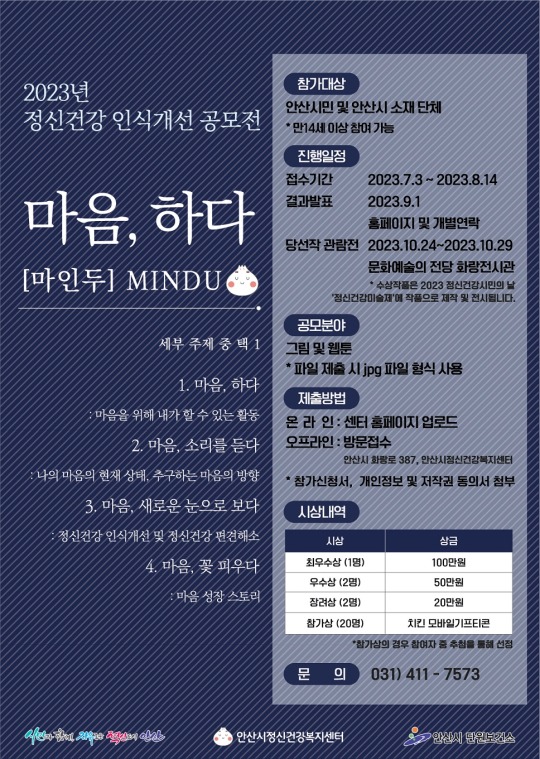
0 notes
Text
RM - Still Life feat. Anderson Paak [lyrics+vocab]

난 still life, but I'm movin'
Just live now, goin' forward, yeah
멈추지 않는 정물 huh
또 피워 나의 꽃을
Gimme no name 'cause I'm untitled
계속 전시되는 내 삶 (oh, yeah)
그래도 삶 (what?) 아직도 삶 (hmm)
▸ 멈추다 - to stop
▸ 정물 - still-life
▸ 꽃을 피우다 - to make flowers bloom
▸ 전시되다 - to exhibit, show
▸ 삶 - life
과건 가버렸고 미랜 모르네 (oh)
두 갈래길에서 숨 고르네
벗어나고 싶어 이 캔버스의 틀 (oh)
어제와 내일이 내게 드리운 그늘
난 그저 담담하게 live errtime (oh)
24/7 yeah, baby, Im on time
난 그저 오늘을 살아 1분 1초마다
가진 전불 다 걸어 what you know about me, huh?
▸ 과거 - past
▸ 미래 - future
▸ 두 갈래길 - a forked road
▸ 숨을 고르다 - to catch one’s breath
▸ 캔버스 - canvas
▸ 틀 - frame
▸ 벗어나다 - to escape
▸ 드리우다 - to cast, throw (a shadow)
▸ 그늘 - shade
▸ 담담하다 - to be calm, composed
▸ 전부를 걸다 - to bet everything
I'm still life (ooh-ooh)
Yeah, can't lock me in the frame, I'm movin', yeah
I'm still life (ooh-ooh)
Life is better than the death, I'll prove it, yeah
Errday is my day one, brother
Baby 난 돈으로 시간을 벌어
걔네 조롱은 듣지 마 니 귀 버려
꼭 버러지들 온라인에 목숨 걸어
Trendsetter? I'm a friend, better
식상해질 정도의 go and getter
결국 네가 원하는 대론 되지 않았지
바램관 달리 너무 잘 살아대네 내 뜻대로 huh
▸ 벌다 - to earn
▸ 조롱 - mockery
▸ 버러다 - to throw away
▸ 목숨을 걸다 - to risk one’s life
▸ 식상하다 - to be fed up with, sick of
(Ninety four) livin' in 한남대로
(Ninety one) look at my 탄탄대로
갈 일이 없어 이젠 강남대로
월세 밀린 넌 빨리 당장 방 빼고
What a poor flex, hon', look at your chain
Me rather do it like look at my stain
오늘을 살아 잡초처럼
걍 화초처럼 but I never stay
▸ 한남대로 - a street in Hannam-dong, Seoul
▸ 탄탄대로 - a “royal” road, a broad and level road
basically 탄탄대로를 걷다 means to pave the way
▸ 강남대로 - a street in Gangnam, Seoul
▸ 월세 - monthly rent
▸ 밀리다 - to be late on (paying) sth
▸ 방을 빼다 - to empty a room (move away)
▸ 잡초 - weeds
▸ 화초 - flowering plant
22 notes
·
View notes
Photo
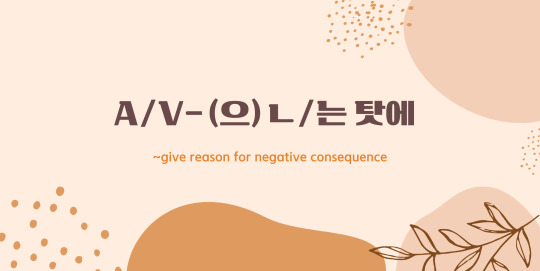
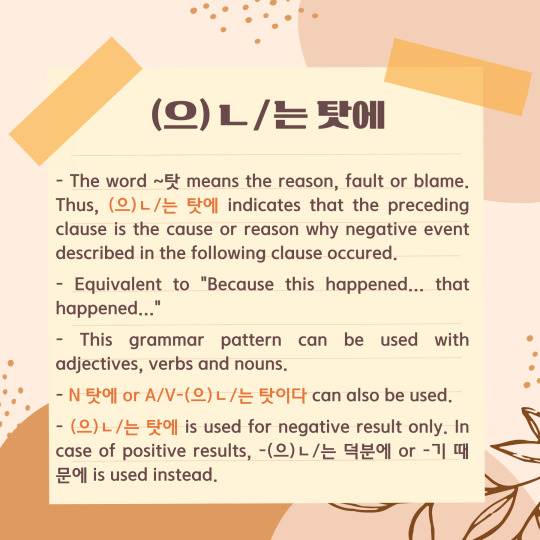
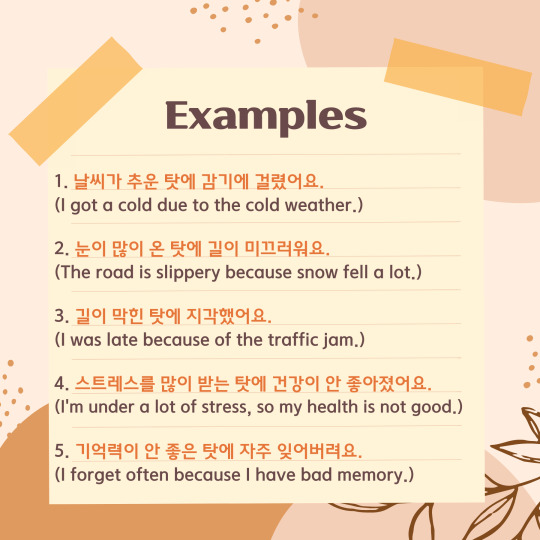
𝐊𝐨𝐫𝐞𝐚𝐧 𝐆𝐫𝐚𝐦𝐦𝐚𝐫: A/V-(으)ㄴ/는 탓에
✏️𝐔𝐬𝐚𝐠𝐞
- The word ~탓 means the reason, fault, or blame. Thus, (으)ㄴ/는 탓에indicates that the preceding clause is the cause or reason why the negative event described in the following clause occurred. The following clause happened due to or because of the preceding clause.
E.g.
날씨가 갑자기 추워진 탓에 감기에 걸렸어요.
(I caught a cold because the weather suddenly turned cold.)
✏️ 𝐂𝐨𝐧𝐣𝐮𝐠𝐚𝐭𝐢𝐨𝐧
- 𝐀𝐝𝐣𝐞𝐜𝐭𝐢𝐯𝐞 + -(으)ㄴ 탓에 (𝐩𝐫𝐞𝐬𝐞𝐧𝐭 𝐭𝐞𝐧𝐬𝐞) / -았/었던 탓에 (𝐩𝐚𝐬𝐭 𝐭𝐞𝐧𝐬𝐞):
덥다 -> 더운 탓에 (because something is hot)
크다 -> 큰 탓에 (because it is big)
- 𝐕𝐞𝐫𝐛 + -는 탓에 (𝐩𝐫𝐞𝐬𝐞𝐧𝐭 𝐭𝐞𝐧𝐬𝐞) / -(으)ㄴ 탓에 (𝐩𝐚𝐬𝐭 𝐭𝐞𝐧𝐬𝐞):
비가 오다 -> 비가 오는 탓에 / 비가 온 탓에 (due to raining)
피우다 -> 피우는 탓에 / 피운 탓에 (because of smoking)
- 𝐍𝐨𝐮𝐧 + (-인) 탓에 (𝐩𝐫𝐞𝐬𝐞𝐧𝐭 𝐭𝐞𝐧𝐬𝐞) / (-였던) 탓에 (𝐩𝐚𝐬𝐭 𝐭𝐞𝐧𝐬𝐞):
추운 날씨 -> 추운 날씨 탓에 (because of the cold weather)
어두움 -> 어두움 탓에 (due to the darkness)
✏️ 𝐒𝐩𝐞𝐜𝐢𝐚𝐥 𝐍𝐨𝐭𝐞
- N 탓에 or A/V-(으)ㄴ/는 탓이다 can also be used.
E.g.
그 배우가 폐암에 걸린 것은 담배를 많이 피운 탓이요.
=그 배우는 담배를 많이 피운 탓에 폐암에 걸렸어요.
The actor got lung cancer from smoking a lot.
- ~(으)ㄴ/는 탓에 is used for a negative result. Therefore, it sounds unnatural if used when the resulting situation is positive. Contrary to this in the case of positive results (으)ㄴ/는 덕분에 or 기 때문에 is used instead of (으)ㄴ/는 탓에.
E.g.
친구가도와준 탓에 한국 생활을 잘할 수 있었어요. (x)
친구가 도와준 덕분에 한국 생활을 잘할 수 있었어요. (o)
(Because of my friend's help, I adapted well to life in Korean.)
✏️ 𝐌𝐨𝐫𝐞 𝐄𝐱𝐚𝐦𝐩𝐥𝐞𝐬
1. 준비운동을 하지 않은 탓에 다리에 쥐가 났어요.
(I got a cramp in my leg because I didn't warm up.)
2. A: 어제 면접 잘 봤어요?
B: 면접 시간에 늦은 탓에 망쳤어요.
(A: How was your interview yesterday?
B: I messed up because I was late for the interview.)
3. 어제 술을 많이 마신 탓에 오늘 아침에 머리가 아팠어요.
(I had a headache this morning because I drank a lot yesterday.)
❤️
Kindly Visit My Blog Here
Available Products Here
Available Korean Writing Notebook Here
#Korean Language#Study Korean#Learn Korean#Korean Grammar#Korean Grammar Rules#Grammar Rules#한국어#한국어 연습#한국어공부중#한국어 문법#한국어단어#한국어능력시험#한국어 배우기#한국어 단어#한국어공부#한국어공부해요
8 notes
·
View notes
Text
﹙ 꽃을 피우다 ﹚ ּ ✿. ۫ 𓈒⠀o’ sweetness all around. she didn’t come empty-handed, but to see a mesmerizing show, a feast for the senses that leaves a lasting impression. a spell of enchantment spun by the hands of fate, a tale of blooming beauty yearning to be shared.

ㅤ︩︪★﹙𝒥 ﹚ ── 𝑒𝑦𝑒𝑑 aᥒ͠gꫀl ׂ 활짝 핀 공주님 ּ { o’ 𝚊𝚕𝚕𝚞𝚛𝚎 } 𓏸𓈒 나비 ּ⠀﹙🌸 ̼﹚ in the midst of blooming petals, whispered secrets of spring fairies a-float. every bloom, a testament to her ethereal presence, spreading the divine fragrances. 요정의 향기.

ㅤִ ㅤ۫ ✿ ̼향수 o’ a͟n͟gel⠀˖ sweet and zesty, this scent is sure to please, with its blend of citrus groves and floral meadows notes. it’s the perfect way to add a touch of freshness to your day, and it will leave you with a surge of energy and a renewed sense of vitality.

0 notes
Photo
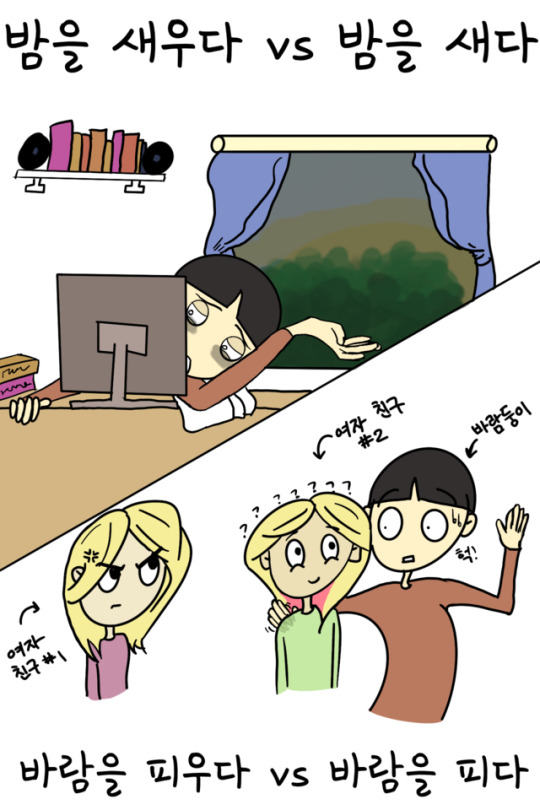
Hey guys, today I have two interesting verbs for you.
새우다 and 피우다. The reason they are interesting is that you often don’t see them in their “correct” form while talking. Some of you might have even noticed this or wondered why you don’t see 새우다 and 피우다 often or if there is a difference.
In textbooks you’ll learn sentences like:
어제 밤을 새워서 공부했어요. I stayed up all night studying yesterday.
But, you don’t hear that sentence too often in real life conversations with friends. Instead, you hear this:
어제 밤을 새서 공부했어요. I stayed up all night studying.
Or
밤을 샜어요. I stayed up all night./I pulled an all-nighter.
In class, newspapers, and in the dictionary, you will (or should) find the verb as 새우다. But, most people (at least in Seoul) use the verb as 새다. 우 completely disappears. 피우다 is the same. In the dictionary and in your books, you’ll see 담배(를) 피우다 and 바람(을) 피우다. But, many people say 담배(를) 피다 and 바람(을) 피다.
밤을 새다 is technically incorrect. But, you’ll hear it more often than the correct version. It’s kind of like “who and whom” in the US. Most people don’t use “whom” at all. They use “who” incorrectly even if they know it’s wrong. That’s because for some weird reason using "who” wrong sounds more natural than using “whom” correctly.
Here are a few examples of the three most common words I’ve come across.
담배를 안 폈으면 좋겠어요. (*안 피웠으면) I wish you didn’t smoke cigarettes.
밤을 새지 마. 숙제는 내일 해. (*새우지 마) Don’t stay up all night. Do your homework tomorrow.
남자 친구가 바람을 피면 끝이야! (*바람을 피우면) If (my) boyfriend cheats, it’s over/it’s the end.
It’s strange that language sometimes sounds better when it’s wrong, right? Just one more reason to not stress about speaking “perfect Korean.” You should use the correct form when writing papers and on tests, but when you’re talking or texting, feel free to use it “incorrectly.”
Anyway, good luck studying guys!
#korean#study Korean#learn Korean#한국어 배우기#한국어 공부#한국어 공부중#한국어#한국말#새우다#피우다#한국어 동사#한국#Korean language#langblr#Korea#한국어공부중#한국어공부#공부#한국어 어휘#한국어 단어#korean vocabulary#Korean words#korean verbs#kpop#bts
155 notes
·
View notes